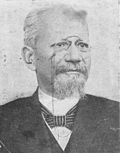1 March 1918 | |||||||||||||||||
Presidential election | |||||||||||||||||
| |||||||||||||||||
 Results by state | |||||||||||||||||
General elections were held in Brazil on 1 March 1918. [1] The presidential elections were won by former President Rodrigues Alves, who received 99% of the vote. [2] However, he died of the Spanish flu in 1919 before he could take office. Vice-president Delfim Moreira became Acting President until fresh elections were held on 13 April 1919.

